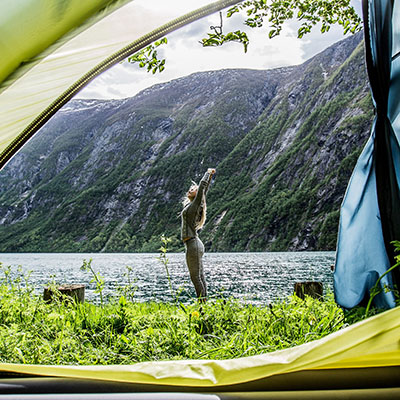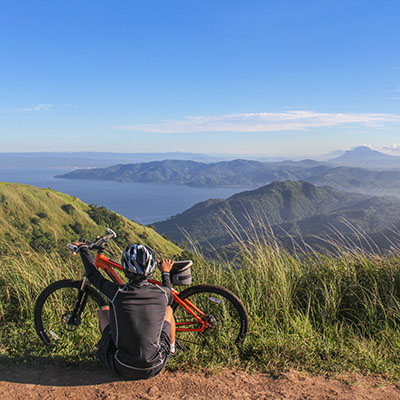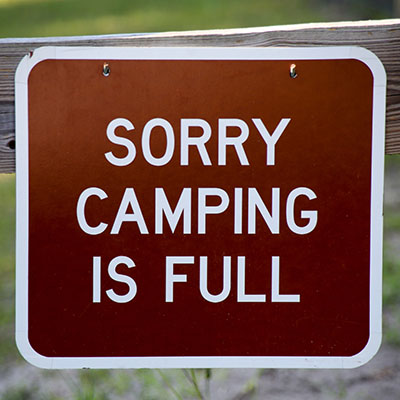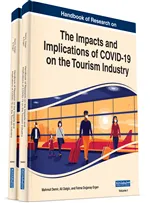Agent Information
← Return to Blog

What Is Alternative Traveling & Why Is Alternative Tourism Important?
Becky Hart | Oct 16, 2023
Share Twitter share

Something just doesn’t feel right. You love to travel, but you’re tired of going to the same places and doing the same things as everyone else. Beyond being bored, you have a gut feeling that that kind of travel isn’t even the “right” thing to do. What you need is alternative tourism.
Alternative Tourism Defined
At its core, alternative tourism, sometimes also called responsible travel, anti-tourism, ethical tourism, and a host of other names, is a response to mass tourism and its negative impact. Through the various types of alternative travel, we can minimize the harm we have on a destination, its environment, culture, and economy.
There are different ways you can become an alternative traveler, but these three basic rules are at the heart of them all:
- Be original. Instead of all-inclusive resorts and package tours, think outside the box about where you can travel and what you can do. Going off the beaten path can lead to authentic, once-in-a-lifetime experiences that support your destination and its people.
- Be intentional. You don’t just fall into alternative travel. Every decision, from where you go to how you get there and what you do upon arrival, has meaning and purpose. Your activity — and leisure time — is mindfully chosen.
- Be sensitive. Even seemingly small actions can have large impacts. Be curious and take time to understand how your presence affects a community. Give back when you can.
Types of Alternative Travel
For as many ways as there are to define alternative tourism, there are just as many ways to practice it. Use these examples of alternative travel as a jumping-off point when intentionally planning your original trip.
1. Ecotourism

Ways to plan an eco-friendly, sustainable trip include:
- Choosing an eco-friendly destination
- Booking hotels that have eliminated single-use plastics
- Opting for public transportation like trains and buses instead of using a personal vehicle
- Walk or ride a bicycle to sightsee
- Dine at restaurants that use locally sourced ingredients
- Avoid animal-based tourism that mistreats wildlife or harms their ecosystem
- Voluntour with a project that cleans pollution from communities or restores wildlife preserves
2. Voluntourism
It’s important to take time for yourself on vacation, but if you’re looking for an alternative way to get away, consider volunteering abroad. By giving back to the community you visit, you have the chance to contribute to that community rather than just take.
Be mindful of the project you take on and the organization you volunteer with. Some are more responsible than others. Make sure you’re asking yourself important questions before voluntouring so you know you’re doing the right thing.
There are plenty of ways to be a responsible volunteer abroad through projects such as:
- Building homes, schools, and health clinics
- Assisting with agricultural and urban farming programs
- Teaching English (or another language)
- Helping with community beautification projects
3. Unplugged travel

Unplugging from technology can improve your health with lower stress, better sleep, and improved mood, among other things. Lower stress not only feels good, but it’s also related to physical health like lower blood pressure and heart health. Better sleep helps our emotional as well as physical wellness ; we need sleep for things like muscle recovery and regulating hormones that affect our weight. Being mindful and present improves our social interactions and relational health, which can be so important for people who experience depression and feelings of isolation.
Not all of us have the skills or desire to totally remove ourselves from civilization. Thankfully, there are ways to get the off-grid benefits of travel without going backcountry camping with nothing but a tent, a roll of duct tape, and your own thoughts. Try these ways to do a digital detox while you travel:
- Don’t get the international plan on your cell phone. You won’t be as tempted to text or post everything you do, so you’ll be more likely to leave your phone at the bottom of your bag. Chances are that you’ll still have internet access, though, so if you do find yourself in an emergency where you need to get in contact with someone, you could still send a quick email or use an app like WhatsApp.
- Choose a destination that has limited internet access (or at least the perception of limited access). I’ll confess that when I went to Nicaragua, I just told everyone that I wouldn’t have internet, period. Was that entirely true? No. But most people back home didn’t know much about Nicaragua, so they took my exaggeration at face value.
- Ween yourself off your devices for a few weeks before your trip. Instead of quitting cold turkey, make a plan to use your phone and other technology a little less each day prior to departure. This can help you feel less panicky when you aren’t constantly checking your email from the beach.
- Ban tech-based entertainment. Make a commitment to yourself — and with your kids — that you will avoid Netflix, YouTube, TikTok, and whatever else you use stay mindlessly preoccupied. Remove entertainment apps from your devices, or better yet, leave your tablets and computers at home. Instead, read a book, play car bingo or a board game together, chat with a stranger, be present with each other and have good conversation.
- Set clear expectations with people back home — work, family, friends — that you will be out of reach during your trip. Make it known that you won’t be checking email until you get back. As long as you clearly communicate this plan, it’s not your fault if Linda from HR gets upset that you didn’t respond immediately.
- Put your phone on airplane mode, even if you aren’t flying. That will quiet all those pesky notifications while still giving you access to your phone in case you do need to contact someone or want to use it to take photos.
4. Slow travel
Slow travel is the idea that, rather than destination hopping and cramming as much activity in your trip as possible, you take your time and immerse yourself in one or two communities. Some have given this type of travel the moniker “nothing-cations,” meaning that they intentionally carve out time for some healthy nothingness.
Slow travel has many personal and environmental benefits. Some say that slow travel can improve our mental health as it gives us time to breathe and reflect, taking a break from the hectic pace of our everyday lives.
When it comes to sustainability, slow travel can be more eco-friendly because we’re using fewer resources on transportation. You may even be able to go without a car if you stay in a smaller community or rely on public transit to get from Point A to Point B.
Plus, many slow travelers choose to rent a vacation home, which allows them to cook their own meals. For some, this lets them focus on using locally sourced ingredients, reducing food waste from oversized restaurant portions, and contributing to the local economy by shopping at farmer’s markets.
5. Adventure travel

But it can also be more than that. Adventurati Outdoor highlights active tourism’s ability to allow “the tourist to step outside their comfort zone.” So while this could include an activity that’s physically exhilarating like climbing a mountain, it could also be something mentally stimulating that causes a bit of culture shock.
There are varying degrees of risk in active travel. So-called “hard adventure” activities like rock climbing and caving have higher levels of danger (and may not be covered by travel insurance , so it’s best to check with an agent before assuming one way or the other). “Soft adventure” activities — camping, fishing, taking a safari, riding in a hot air balloon — typically are less risky.
Regardless of the type of activity, though, you’re on the move. If you love adventure tourism, you’re likely someone who recharges their battery through action and excitement, rather than the slow traveler who feels more refreshed in quiet moments that give time for observation and reflection.
Alternative Destinations
Many of these types of alternative travel take you to less popular destinations. After all, places are “off the grid” precisely because there aren’t many people there. This leads us to another key piece of alternative travel: avoiding overtourism.
What is overtourism?
Overtourism happens when too many people visit a destination, causing harm to that place. It may be that the influx of visitors dilutes the local culture, makes the destination too expensive for locals to live there, physically damages infrastructure or cultural sites, or negatively impacts the environment.
How to prevent overtourism
Many countries are encouraging tourists to explore cities beyond the usual hot spots. The French government reported that 80% of its tourism is located in just 20% of the country.
If you still want to see these iconic destinations — there is only one Sagrada Familia, after all — rest easy knowing that there are still ways you can visit responsibly.
Paris, France

If 80% of France’s tourism activity takes place in just 20% of the country, where are all the people going? Paris and the French Riviera, primarily. Paris is bound to get even busier heading into the 2024 Olympics, too. Large crowds make it difficult to access the very things you came to — the Eiffel Tower, the Louvre, the Palace of Versailles — and high prices make it tough on tourists as well as locals who struggle to afford an everyday life there.
Marseille is the second-largest city in France, so you’ll still find plenty of quintessentially French experiences, but you’ll find it for considerably less money than in Paris or the French Riviera. The Loire Valley is another great alternative destination, especially if you’re into wining, dining, and castles.
Barcelona, Spain
This Spanish port city suffers from huge numbers of tourists coming in on cruise ships, looking around for a few hours, and then leaving without spending much money. Their presence contributes to overcrowding, but they do little to contribute to the local economy.
To bypass Barcelona, try Girona, only about 60 miles (100km) away. Much like Barcelona, you’ll find Old Town architecture, pedestrian ways full of shopping and restaurants to remind you of La Rambla, art, and cobblestoned streets. What you won’t find are massive crowds of tourists and prices to match.
If you do visit Barcelona, stay at least a night or two so that you can experience this city to its fullest and help it benefit from your tourism dollars. Visit Gaudi sites other than La Sagrada Familia, or if you must cross the highlights off your bucket list, visit at off-peak times.
Venice, Italy

If it’s the canals of Venice that intrigue you, look to one of the other islands on the Venice Lagoon. They’ll each have their own personality, but they’ll almost all be less crowded and (somewhat) more reasonably priced than their more famous neighbor. For art and culture, consider a home base like Padua and venture out from this centrally located university town to visit top destinations like Milan and Florence.
To see Venice more responsibly, like Barcelona, stay long enough to contribute to the community and visit during shoulder season .
Machu Picchu, Peru
It’s one of the most iconic spots in South America if not the world. Many people will go to Peru with the sole purpose of visiting this Inca city, and with so many visitors, the ruins can crumble and erode.
Although Peru is filled with amazing archaeological sites, nowhere else is quite like Machu Picchu, so when you do visit, stay on the trails and avoid climbing or touching anything that could damage this priceless site.
Great Smoky Mountains National Park, Tennessee, USA

The Smokeys have long been the most visited national park in the U.S. in part because of how close it is to “civilization.” You can easily make a day trip of it from nearby cities. Also among the most popular parks are the Grand Canyon, Rocky Mountain National Park, Yellowstone, and Yosemite. So many human visitors can put strain on wildlife and the natural environment, causing the beauty you came to experience to deteriorate, sometimes irreversibly.
Visiting these parks during the offseason can give you an equally gorgeous, albeit a different, view. Or you can swap them out from one of the nation’s many other parks. Instead of the Great Smoky Mountains, try Shenandoah or Congaree national parks. Trade the Grand Canyon for Utah’s Canyonlands or Yellowstone for Lassen Volcanic National Park in northern California.
Travel Insurance for Alternative Tourism
We often hear, “Is travel insurance necessary if my destination has universal healthcare?” It helps to remember that someone is paying for medical care if you get sick or hurt during your trip. In countries that have universal healthcare, that’s the local government or taxpayers. What better way to minimize stress on a destination’s economy than by making sure you can pay for your own care?
Travel insurance can cover the expense of necessary medical treatment so that you don’t have to worry about paying out of pocket, and your host culture doesn’t have to foot the bill for you, either.
It can also cover trip expenses if you have to cancel or interrupt your trip for a covered reason, if you have a travel delay, or if something happens to your belongings. And when all of Seven Corners’ plans come with travel assistance services , you can focus on enjoying the trip instead of what to do if the unexpected happens.
You’re changing the way you think about travel. Why not also change the way you think about travel insurance and consider it an important part of planning a mindful, intentional trip.
Escape the Ordinary with Seven Corners Travel Insurance
No matter where your alternative travel takes you, make sure you have the right coverage. Answer a few simple questions with our interactive guide or talk to a live agent . We're ready to answer all your questions and find the best plan for your trip.
Travel Like a Pro with The Wayfinder
Did you enjoy this blog? Get more articles like it before anyone else when you subscribe to our monthly newsletter, The Wayfinder.
- Infographics
- Study Abroad
- Testimonials
- Travel Destinations
- Travel Insurance Advice
- Travel Tips
Search Posts
Newsletter alert
Receive our monthly inspiration and travel tips from the travel insurance experts.

303 Congressional Blvd.
Carmel, Indiana 46032
Our Markets
- Consumer Insurance
- Government Solutions
- Trip Protection
- Trip Protection Annual Multi-Trip
- Trip Protection USA
- Travel Medical
- Travel Medical Annual Multi-Trip
- Travel Medical USA Visitor
- Mission & NGO
- Medical Evacuation and Repatriation
- Partnerships
- 24 Hour Urgent Travel Assistance
- Frequently Asked Questions
- Developer Portal
- System Status
Copyright © 2024 Seven Corners Inc. All rights reserved.
Privacy | Cookies | Terms of Use | Security
Alternative Tourism vs. Mass Tourism
What's the difference.
Alternative tourism and mass tourism are two contrasting approaches to travel and vacationing. Mass tourism refers to the traditional form of tourism that involves large numbers of people visiting popular destinations and engaging in typical tourist activities. It often focuses on well-known attractions, resorts, and entertainment options. On the other hand, alternative tourism is a more niche and sustainable form of travel that emphasizes unique experiences, cultural immersion, and environmental conservation. It encourages travelers to explore off-the-beaten-path destinations, interact with local communities, and engage in activities that have a positive impact on the environment and local economy. While mass tourism offers convenience and accessibility, alternative tourism provides a more authentic and enriching travel experience.
Further Detail
Introduction.
Tourism is a thriving industry that contributes significantly to the global economy. However, not all tourism is created equal. Two distinct forms of tourism have emerged over the years - alternative tourism and mass tourism. While both types involve travel and exploration, they differ greatly in terms of their attributes, impacts, and experiences offered to tourists. In this article, we will delve into the characteristics of alternative tourism and mass tourism, highlighting their differences and exploring the benefits and drawbacks of each.
Definition and Scope
Alternative tourism, also known as sustainable tourism or responsible tourism, refers to a form of travel that focuses on minimizing negative impacts on the environment, culture, and local communities. It emphasizes authenticity, local engagement, and sustainable practices. On the other hand, mass tourism, also referred to as conventional tourism or mainstream tourism, involves large-scale travel operations that cater to a wide range of tourists, often resulting in overcrowding, environmental degradation, and cultural commodification.
Environmental Impact
One of the key distinctions between alternative tourism and mass tourism lies in their environmental impact. Alternative tourism seeks to minimize its ecological footprint by promoting practices such as eco-lodges, renewable energy use, waste reduction, and conservation initiatives. It encourages tourists to engage in activities that foster environmental awareness and preservation, such as nature walks, wildlife conservation projects, and sustainable farming practices.
In contrast, mass tourism often leads to significant environmental degradation. The large influx of tourists can strain local resources, contribute to pollution, and damage fragile ecosystems. Popular tourist destinations often face challenges such as deforestation, water scarcity, and pollution due to the excessive demands of mass tourism. The carbon footprint associated with transportation and energy consumption in mass tourism is also considerably higher compared to alternative tourism.
Socio-cultural Impact
Alternative tourism places a strong emphasis on cultural immersion and community engagement. It encourages tourists to interact with local communities, learn about their traditions, and support local businesses. This form of tourism often involves homestays, community-based tourism projects, and cultural exchanges, allowing visitors to gain a deeper understanding of the local way of life. By promoting cultural preservation and respect, alternative tourism helps to safeguard traditional practices and empower local communities.
Mass tourism, on the other hand, can have negative socio-cultural impacts. The sheer volume of tourists can lead to overcrowding, loss of authenticity, and the commodification of local culture. Popular tourist destinations may become overrun with souvenir shops, fast-food chains, and generic attractions, eroding the unique character of the place. Additionally, the economic benefits of mass tourism are often concentrated in the hands of large corporations, with limited trickle-down effects on local communities.
Economic Considerations
Alternative tourism can provide economic opportunities for local communities, particularly in rural or underdeveloped areas. By promoting small-scale enterprises, local crafts, and sustainable agriculture, alternative tourism helps to diversify local economies and reduce dependence on a single industry. It encourages tourists to spend their money on locally produced goods and services, ensuring a more equitable distribution of wealth.
In contrast, mass tourism tends to benefit larger corporations and international hotel chains. The revenue generated from mass tourism often flows out of the destination, limiting the economic benefits for local communities. Moreover, the reliance on mass tourism can create an unstable economy, as destinations become vulnerable to fluctuations in tourist arrivals and global economic conditions.
Experiential Differences
Alternative tourism offers a more immersive and authentic experience for travelers. It allows tourists to connect with nature, engage with local communities, and gain a deeper understanding of the destination. Activities such as hiking, volunteering, and cultural exchanges provide unique and meaningful experiences that go beyond the surface-level attractions.
Mass tourism, on the other hand, often focuses on popular landmarks, entertainment, and superficial experiences. It caters to a wide range of tourists with diverse interests, offering standardized packages and attractions that may lack depth and authenticity. The emphasis is often on ticking off popular tourist sites rather than fostering a genuine connection with the destination.
Alternative tourism and mass tourism represent two distinct approaches to travel and exploration. While alternative tourism prioritizes sustainability, cultural preservation, and community engagement, mass tourism tends to prioritize convenience, accessibility, and profit. The environmental, socio-cultural, and economic impacts of these two forms of tourism differ significantly, as do the experiences they offer to travelers. Ultimately, the choice between alternative tourism and mass tourism depends on individual preferences, values, and the desire to make a positive impact on the destinations we visit.
Comparisons may contain inaccurate information about people, places, or facts. Please report any issues.
- Architecture and Design
- Asian and Pacific Studies
- Business and Economics
- Classical and Ancient Near Eastern Studies
- Computer Sciences
- Cultural Studies
- Engineering
- General Interest
- Geosciences
- Industrial Chemistry
- Islamic and Middle Eastern Studies
- Jewish Studies
- Library and Information Science, Book Studies
- Life Sciences
- Linguistics and Semiotics
- Literary Studies
- Materials Sciences
- Mathematics
- Social Sciences
- Sports and Recreation
- Theology and Religion
- Publish your article
- The role of authors
- Promoting your article
- Abstracting & indexing
- Publishing Ethics
- Why publish with De Gruyter
- How to publish with De Gruyter
- Our book series
- Our subject areas
- Your digital product at De Gruyter
- Contribute to our reference works
- Product information
- Tools & resources
- Product Information
- Promotional Materials
- Orders and Inquiries
- FAQ for Library Suppliers and Book Sellers
- Repository Policy
- Free access policy
- Open Access agreements
- Database portals
- For Authors
- Customer service
- People + Culture
- Journal Management
- How to join us
- Working at De Gruyter
- Mission & Vision
- De Gruyter Foundation
- De Gruyter Ebound
- Our Responsibility
- Partner publishers

Your purchase has been completed. Your documents are now available to view.
Chapter 1. Alternative Tourism: Concepts, Classifications, and Questions
From the book tourism alternatives.
- Douglas G. Pearce
- X / Twitter
Supplementary Materials
Please login or register with De Gruyter to order this product.
Chapters in this book (21)

Alternative Travel: What Is It and Is It The Future of Travel?
Travel is back and bigger than ever – 49% of Americans say they plan on traveling more in 2023, while 87% said they expect to travel at least as much as they did in 2022, Forbes reports. Travelers are now increasingly looking for alternative travel experiences .
This post may contain affiliate links. Please read our disclosure and privacy policy for more information.
Although there’s no set definition for alternative travel, it essentially involves authentic and meaningful travel experiences that positively impact the environment and locals. Fortunately, many alternative travel booking sites are available to help travelers design transformational travel experiences that offer something different and unforgettable.
An alternative travel concept emerged in the 1970s as a response to mass tourism’s adverse economic, environmental, and social effects, which were accused of being unsustainable, inauthentic, and superficial.
Byway: Sustainable, Flight-free Travel
As people become increasingly environmentally conscious daily, eco-travel is now a priority for many travelers. Frequent fliers – meaning Americans who take over six flights a year – account for two-thirds of air travel and individually emit over three tons of carbon dioxide annually, the New York Times reports. The solution? Byway.
About Byway
This sustainable travel agent helps you book flight-free vacations across Europe that rely on bus, train, and boat (taking the train instead of a plane, for example, can slash your carbon footprint by up to 90%). Byway maps out your entire journey, including bag storage and luggage transfer. They also recommend and book sustainable accommodation wherever it’s an option. The final price includes accommodation, all transport, and a personalized itinerary in a single, easy-to-view PDF. Travel experts will also provide advice and support during your trip via WhatsApp. Even better, tickets are usually flexible, meaning you can change your trip either before or during, with non-existent or low fees.
Byway’s Nightjet Sleeper Train
For instance, with Byway, you can take the Nightjet sleeper train to Vienna ; you’ll depart from London and stop off in Paris before arriving in the stunning Austrian capital (the trip lasts six days in total). Vienna is brimming with music, art, vibrant culture, and delicious food. Watching the Vienna State Opera perform at the Vienna Opera House is a must. 40-minute guided tours of the beautiful building are available (it’s one of the most famous opera houses in the world).


Byway’s Trains and Ferries
Alternatively, take the ferry and train from London to Morocco. That’s right: Intercontinental flight-free travel is well within your reach. You’ll journey through France (nothing beats the stunning views of the gorgeous French countryside) and spend one night in Nîmes, often called “the most Roman city outside of Italy.” It has bustling streets, beautiful buildings, charming squares, and numerous stunning and well-preserved Roman monuments.
The next day, you’ll travel through Barcelona and spend a night in Madrid – the capital of Spain and home to the largest palace in Europe . You’ll then cross the strait of Gibraltar and catch the Tangier ferry, taking you into northern Africa .
Be sure to check out the Rock of Gibraltar while on the water; it’s a massive, famous limestone promontory reaching 426 meters tall. You’ll journey through several vibrant Moroccan cities on high-speed trains, including Fez, Tangier, Casablanca, and Chefchaouen. Don’t worry; you’ll have plenty of time to get out and explore.
Wild Women Expeditions: Female Adventure Travel

Solo travel is all the rage. Google searches for solo travel have quadrupled since 2020, with searches for solo flights also being 36% higher in 2023 than they were in 2022, Business Insider reveals. The benefits of solo travel are numerous. Not only is it cost-effective, but you’re entirely in charge of your schedule. That means you can be selfish and go where you please without considering your travel companion’s desires. The benefits of solo travel for women can also be particularly life-changing. You’ll gain total freedom and autonomy while traveling alone, which is excellent for building confidence and self-esteem.
Safety Concerns for Solo Travelers
However, personal safety is naturally a concern for female solo travelers, and you can travel with greater peace of mind by visiting locations generally known to be safer . For example, Orlando, Florida, is one of the safest cities for women solo travelers in the United States. One of the most famous cities in the States, Orlando is packed with things to do , including numerous thrilling theme parks, like Universal Orlando Resort and Walt Disney World Resort.
About Wild Women Expeditions
You can also book a trip through Wild Women Expeditions: a worldwide leader in women’s adventure travel. Wild Women Expeditions is ideal for solo female travelers looking for an enriching adventure while benefiting from an organized tour’s support and safety. Most women who go on a Wild Women Expedition experience are solo travelers, so you’ll quickly make friends. But you can also bring a friend or several with you if desired.

Accommodations With Wild Women Expeditions
Accommodation is typically shared, yet a private room can be arranged at an extra cost. Women “of all ages, sexual orientations, and identities” are welcomed on these expeditions. Trips also cater to all abilities and fitness levels – “whether your greatest skill is tracking a storm or talking up a storm, summiting mountains or summoning courage, keeping your kayak in line or coloring outside the lines,” the company explains.
Group sizes are small, ranging between six and 14 women, depending on the individual trip. In most cases, you can expect groups of around eight women. Wild Women Expeditions also supports local women, hiring women for every role, including tour leaders and guides. Furthering their efforts to make the world a better place, the company also works with women’s rights and social justice organizations on both a local and national level. And last but not least, Wild Women Expeditions is also committed to responsible tourism. Trips are designed to make no or minimal impact on Mother Nature wherever possible. They also support environmental education, advocacy campaigns, and community projects.

Regarding travel, Wild Women Expeditions go to 31 unique destinations worldwide, and itineraries are usually packed with outdoor activities and adventures. Their user-friendly website allows you to filter your options by country or movement. For instance, embark on a Haida Gwaii kayaking adventure in British Columbia, Canada. Two professional sea kayak guides will accompany the group. As you paddle through the Gwaii Haanas National Park Reserve waters, you’ll enjoy the untouched wilderness’s pure serenity. Look out for the rare Peale’s peregrine falcon; around 12% of this unique species is home in British Columbia.
India Jungles and Jewels
Or, you can instead take the India Jungles and Jewels experience: a ten-night stay in a luxury eco-lodge accommodation in a gorgeous country rich in culture and beauty. Your trip starts with a visit to Kanha National Park in the heart of the central Indian Highlands.

You’ll see plenty of incredible wildlife here, including tigers, sloth bears, leopards, and endangered swamp deer (hard-ground barasingha). You’ll also get to enjoy a tasty picnic from the beauty of the Indian jungle. And don’t miss the opportunity to watch the majestic elephants: conservation staff working in the park usually take them down to the Banjar River every afternoon, and you can watch them having fun splashing around in the mud and water.
The Luminaire: Luxury, Educational Travel Experiences
Alternative travel also involves meaningful, in-depth experiences beyond the ordinary. Instead of visiting a location and only having time to see the main tourist attractions, travelers are now looking to make the most out of their visit. This often means enjoying an educational experience during which they learn something new.

About Luminaire
Enter the Luminaire: a new luxury travel company that provides travelers with personalized and educational backgrounds. “There is a new generation of travelers that above other types of experience, such as an adventure or just a sandy beach, want to gain real and new perspectives on the world,” co-founder and CMO of the Luminaire, Nicholas Priest tells Forbes. “They don’t want to go to a place and be told about it; they want to engage and immerse themselves in a story and come away with a feeling of permanent change having learned something.”
A recent survey conducted by the luxury travel company found that nearly 90% of respondents ranked their desire to participate in “luxury educational travel experiences” at either 8, 9, or 10 out of 10.
Unique Destinations
So, if you yearn for knowledge and to learn about your chosen destination’s rich history and culture, the Luminaire is the place to go. Several unique journeys are listed on their website, and these trips can also be customized to suit your individual preferences. Entirely personalized trips can be created solely based on your interests and needs.
First, a travel designer will chat with you about your passions and goals for traveling and share their personal experience and travel tips . Next, they’ll create a proposal tailored to your travel needs and interests. You’ll then be able to view the bid and request any adjustments until you’re pleased with the itinerary. A finalized itinerary will be provided before our trip – complete with travel tips and restaurant recommendations to ensure everything is as smooth and successful as possible.

Luminaire’s Expertise
Through the Luminaire, travelers can tour fascinating destinations led by various knowledgeable and engaging experts, such as archaeologists, historians, artists, naturalists, and explorers. For example, a Somerset experience will immerse you in the natural beauty of South West England as award-winning photographer Don McCullin CBE takes you on a photographic journey. McCullin leads an evening and day workshop where participants can practice and hone their photography skills. You’ll also learn about McCullin’s love for photography and Somerset’s rural, wild landscapes.
Luminaire’s Unusual Destinations
Alternatively, if you’re passionate about history and nature, a trip to Argentina may be just what you need. Venture into the country’s less-traversed northern regions, and spend time trekking through the valleys of Los Cordones and camping in the salt flats of Salinas Grandes – the third largest salt flats in the world.

This is your chance to learn about the fascinating ethnogeography of this culturally vibrant region. A private visit to the Juan B. Ambrosetti Ethnographic Museum in Buenos Aires is a particular highlight. Here, you’ll learn about the museum’s impressive collections of ethnography, archeology, and biological anthropology.
Alternative travel experiences are shaping up to be the future of travel. Use any emerging alternative travel booking sites to plan your dream trip and prepare for the experience of a lifetime.
What is alternative travel?
Alternative travel has no definition but typically involves meaningful and transformative travel experiences beyond the typical vacation.
Sustainability is often prioritized as travelers aim to minimize their carbon footprints and leave a positive lasting impact on the environment.
Going solo is also another characteristic of alternative travel. Unlike the typical relaxed and passive tourist, solo travel paves the way for a more active, immersive experience.
What are the benefits of alternative travel?
Alternative travel has many benefits depending on the trip you decide to take. By leaving a minimal impact on the environment, alternative travel experiences aim to protect Mother Nature while also providing a greater understanding of the local environment, as well as the culture and history of the destination. In turn, travelers can enjoy a richer, more meaningful experience. Outdoor adventure experiences are also thrilling to explore remote and peaceful destinations you may not otherwise see.
What are the best alternative travel booking sites?
The best alternative booking sites depend on your unique interests and needs as a traveler. To minimize your carbon footprint, Byway offers flight-free sustainable travel. If you’re a woman interested in solo adventure travel, Wild Women Expeditions offers various outdoor activities worldwide for thrill seekers and nature lovers. And, if you’re looking for a luxury, educational trip, the Luminaire design experience will teach you something new about the world.
Closing Thoughts
The alternative travel concept emerged in the 1970s as a response to mass tourism’s adverse economic, environmental, and social effects, which were accused of being unsustainable, inauthentic, and superficial.
Looking For More? Start Here:
- 20 Best Ways to Earn Lots of Credit Card Rewards Points
- Airline Passenger Rights – The 12 Steps to Handle Flight Cancellations
- How To Survive A Long-Haul Flight
- Multi-City Flights – A Travel Hack You Need to Know!
- Norwegian Airlines Review – 5 Reasons To Use Norwegian Air
- Romantic Beach Dinner Ideas
- When Do You Need A Travel Visa: The Complete Guide To Visa Requirements By Country
- Wizz Air Review – Europe’s Worst Airline You Should Avoid
We participate in the Amazon Services LLC Associates Program, an affiliate advertising program designed to provide a means for us to earn fees by linking to Amazon.com and affiliated sites.
Share with others!
Nikki Webster is a travel writer who covers how to travel while grinding a day job without breaking the bank. Nikki is always in search of off-the-beaten-track experiences and unique stays. She is particularly fond of Florida and writes extensively about the state. She flies around 60,000 miles annually and has visited 74 countries, 50 states, and six continents. You can read all about her travels at www.britonthemove.com or follow along on Facebook, Pinterest, and Instagram.
Similar Posts

Travel to Cuba – Yes Americans Still Can!
Many of us have romanticized travel to Cuba. We often don’t because of the unknown. We did it in May of 2017, and it was terrific. Cuba is rich in history and culture, safe, inexpensive, and unique. It’s not the typical Caribbean most Americans are accustomed to, but that’s what makes it unique. Cuba is…

Geyserville California – Glamping in Style
Geyserville is a town most of us have never heard of the place, and who knew that social distancing would become a thing? I didn’t, and it dramatically altered my California trip with my eleven-year-old nephew Landon aka “The Monkey,” in an adventurous way. The original plan was two nights in each of the following…

Kitch-iti-kipi – Big Spring in Michigan
Summer in Michigan is unlike anything else. Summer in the Upper Peninsula (UP) is something everyone should experience at least once. One of Michigan’s most unique attractions, Kitch-iti-kipi, often called “Big Spring,” is a natural water source 40 feet deep and 200 feet wide. In the early days, The Big Spring was also called the…

Hotel Del Salto at Tequendama Falls – Colombia
Since I saw the photos of Hotel Del Salto at Tequendama Falls, I have wanted to visit this allegedly haunted hotel. Colombia was already on the list for 2019, and I chose Bogota explicitly to see this once a hotel, now a museum. Besides the obvious reasons, like being directly opposite a huge waterfall, the…

Exploring The Florida Map – 7 Stunning Offbeat Destinations
Have you ever wanted to have a vacation in Florida? We bet that many of you will say yes, which is unsurprising. For years, Florida has been one of the most trending spots in the US that drive crowds of travelers from the US and all across the globe. And there are many reasons for…
Leave a Reply Cancel reply
Your email address will not be published. Required fields are marked *
Save my name, email, and website in this browser for the next time I comment.
At WiseTour, we're committed to delivering accurate, trustworthy information. Our expert-authored content is rigorously fact-checked and sourced from credible authorities. Discover how we uphold the highest standards in providing you with reliable knowledge.
Learn more...
What Is Alternative Tourism?
Alternative tourism is when people tour things and places other than the usual tourist attractions. In this type of tourism, visitors often interact more with the locals rather than simply looking at big buildings or historical sites. The local cultures, families and communities are emphasized over mainstream tourism. There are three main categories of this type of tourism: nature-based tourism, cultural tourism and adventure tourism. All three categories could interconnect, depending on the specific desires and abilities of the tourist.
This type of tourism is among the rarer forms of tourism. Many people desire the resort type of tourism, which is mainstreamed and often packaged in well-advertised bundles. Travelers typically will not ask for alternative tourism options when they are planning trips to other areas. The natural settings and everyday lives of the people who live in an area are what truly make up alternative touring, and the packages are easier to obtain because of their lower popularity.
Recognizing an alternative tourism package over a mainstream tourist opportunity simply involves reading the details of the trip. A company that offers golf tours in its alternative packages might have the wrong definition of this type of tourism. A true alternative touring package includes as few non-native elements as possible. After an alternative vacation, the vacationer should feel that he or she has experienced the true essence of the area, rather than seeing only the flashy, advertised eye-catchers.
Nature-based tourism is also referred to as ecotourism . This branch of alternative tourism takes individuals into the natural environment of the region. Packages include biking, hiking, rafting and other outdoor activities specific to the natural area. A tourist who is interested in ecotourism will choose the activity level of the tour package; the activities will range from studying the natural flora and fauna to experiencing the various local outdoor activities practiced by the natives.
Cultural tourism is the ethnic and religious sector of alternative tourism. Individuals who are interested in cultural tourism will discover the rural, ethnic and religious practices of local residents. Wine and local cuisine tours are often included in these packages, as well as tours of the local music scene. Tourists receive an in-depth look at how people live, work, play and interact with their natural environments.
Adventure tourism is popular in areas such as South Africa and ocean or mountainous regions. Physically active tourists might choose this form of alternative tourism when they are interested in longer hikes, safaris or more challenging physical activities. Deep-sea diving, mountain climbing and cave exploring are among the activities found in an adventure tourism package.
AS FEATURED ON:

Related Articles
- What Is War Tourism?
- What Is Disaster Tourism?
- What is Horse Trekking?
- What is the Hospitality Industry?
- What is an Ecolodge?
Discuss this Article
Post your comments.
- By: VILevi Rafting is a popular ecotourism activity.
- By: Richard Carey Adventure tourism may include deep-sea diving activities.
- By: Massimo Rock climbing may be part of an alternative tourism package.
- By: vetal1983 Scenic nature hikes are a popular form of alternative tourism.
- By: Marina Karkalicheva Skiing might be part of a winter tourism package.
- By: meoita People interested in alternative tourism may charter aerial tours of a destination.
- By: Moreno Soppelsa Cave exploration may be part of an alternative tourism experience.
- By: caspernhdk Livestock farms might be part of an alternative tourism package.

Justraveling
Travel as It Should Be
Alternative Travel: Let’s Try to Define It
Contemporary Alternative Travel emerged as a concept in the early 70s, in reaction to the negative economic, environmental, and social effects of mass tourism, accused of being unsustainable, inauthentic, and superficial.

T he term is ambiguous, sometimes confusing, and many variations have been suggested, such as Responsible Travel or Soft-Tourism. The naming saga also includes Geotourism, “tourism that sustains or enhances the distinctive geographical character of a place…” (coined by National Geographic ) and Slow Travel, “a way of slowing down your vacation” (a TM of Internet Brands ). All perfectly legitimate and interesting, but we prefer to stick to the original.
To further help clarify and put some order into things, we have classified the following types of Alternative Travel : Ecotourism , Active & Adventure Travel , Cultural or Educational Travel , Voluntourism , and Post-Tourism .
But beyond academic definitions and classifications, what have all these novel forms of travel in common? A quest for originality, the refusal to conform to ordinary tourists (pioneering & discovering) and the relationship with the local environment (being green). In short: travel differently! Or, as stated in a Chiang Mai Workshop in 1984: “ alternative tourism promotes a just form of travel “.
Nowadays, we prefer the term “traveler” to define the alternative tourist. This brings us back to the epic trips of the self-styled explorers of the 19 th century.
A traveler favors individual arrangement and spontaneous decisions towards standard package tours and fixed programs, often travels solo or in small groups, makes more trips than the average, and is far more curious, sensitive, and active, compared to the comfortable and passive tourist. They are also willing to accept a certain amount privation and the lack of familiar cues and habits.
Beside enjoying their journey, alternative travelers strive to minimize local negative impacts of their presence, preserving community stability and well-being, and often giving back to help, if deemed necessary. Interpretation and understanding are key to connect with a place and its people, as opposed to merely sightseeing and expecting to be entertained and fed all the time.
In practical terms , this means for instance: traveling in low season, choosing local operators and low density/moderately commercialized areas, preferring public or no-fuel transportation and traditional/small-scale accommodations.
All things that we strongly endorse, of course. We are not philosophers, but to better clarify on what principles a just form of travel should be based, we’ve prepared our own MANIFESTO . So, you have no excuses to stop reading.
Related Content: What Is Ecotourism All About? , Active and Adventure Travel , Cultural and Educational Travel , Voluntourism: Volunteer Travel Abroad , Post-Tourism: Traveling Without the Hassle , Special Interest Tourism .
Share this page:
- Click to share on Twitter (Opens in new window)
- Click to share on Facebook (Opens in new window)
- Click to email this to a friend (Opens in new window)
Privacy Overview
This website uses cookies to improve your experience while you navigate through the website. Out of these cookies, the cookies that are categorized as necessary are stored on your browser as they are essential for the working of basic functionalities of the website. We also use third-party cookies that help us analyze and understand how you use this website. These cookies will be stored in your browser only with your consent. You also have the option to opt-out of these cookies. But opting out of some of these cookies may have an effect on your browsing experience.
Necessary cookies are absolutely essential for the website to function properly. This category only includes cookies that ensures basic functionalities and security features of the website. These cookies do not store any personal information.
Any cookies that may not be particularly necessary for the website to function and is used specifically to collect user personal data via analytics, ads, other embedded contents are termed as non-necessary cookies. It is mandatory to procure user consent prior to running these cookies on your website.
Alternative Tourism – your next destination?
![Alternative Tourism - your next destination? 1 alternative tourism greece pindus , By SlavaBogur (Own work) [CC-BY-SA-3.0 (http://creativecommons.org/licenses/by-sa/3.0) or GFDL (http://www.gnu.org/copyleft/fdl.html)], via Wikimedia Commons](https://mindfultravelexperiences.com/wp-content/uploads/2013/10/Sarakatsan_Greece_Pindus-768x510.jpg)
For those who are looking to visit a place while having a unique experience, they may explore alternative tourism options.
This type of tourism refers to experiencing a location from a point of view different from those available through mass tourism options.
For example, one might explore only the churches in a city, or based on a minority ethnic group represented in its population.
The general consensus in defining alternative tourism is that this type of travel allows the tourist and the locals to become better acquainted with one another.
Environmentally focused tours have usually been considered alternative tourism options but there are many other options with different approaches.
![Alternative Tourism - your next destination? 2 alternative-tourism-greece-kantili, By Ggia (Own work) [CC-BY-SA-3.0 (http://creativecommons.org/licenses/by-sa/3.0)], via Wikimedia Commons](https://mindfultravelexperiences.com/wp-content/uploads/2013/10/alternative-tourism-greece-kantili.jpg)
Many people travel with the wish of being immersed in the culture they are visiting, and not only a spectator.
Through this kind of tourism this wish becomes a reality and the traveler can look, hear and feel his host community as an insider.
Some options of alternative tourism include Natural Travel which focuses on the natural resources of a location, their preservation and diversity.
While some opportunities may focus on conservation, others include adventure (for example zip-lining over a tree canopy) and the overall exposure to our natural environment.
By contrast, some alternative tourism may focus on exploring the culture of different places. Some may take a religious tour of a region, participated in archeological digs, or become familiar with the farmlands.
The traveler will have the distinct opportunity to interact with the local culture and learn from it directly from its members.
Pop culture tourism, for example, focuses on seeing famous sites where pop culture figures live, work, etc. as well as well-known entertainment industry landmarks.
More obscure types of alternative tourism include ghost tourism, where the traveler visits different allegedly haunted sites and learns about their history.
Disaster tourism is a fairly new type of travel where the tourist reaches out to areas afflicted by natural or man-made disasters to offer help. For example, Hurricane Katrina’s impact in New Orleans generated a great deal of this type of travel.
Sustainable tourism is sometimes used as an overarching term for some alternative forms of tourism and it refers to the idea that tourism through any region should be an enriching activity for both the traveler and the host and it should not be to anyone’s detriment.
It is anticipated that this form of traveling will actually become more mainstream in future years.
![Alternative Tourism - your next destination? 6 alternative tourism greece agrafa, By costas78Costas78 at el.wikipedia [Attribution], from Wikimedia Commons](https://mindfultravelexperiences.com/wp-content/uploads/2013/10/Agrafa01.jpg)
The lesson to be taken away from learning about alternative tourism is that there are many ways of experiencing a culture and geographic location.
Whereas mass travel arrangements definitely have a place in the tourism industry and is well-received by many, there is now a tendency towards being able to travel while leaving a positive impact on the places visited.
Younger generations have adapted this form of travel and have been successful in traveling the world while leaving a legacy in many communities.
So if you are a traveler that likes to explore beyond the usual tourist sites, you may want to inquire about out-of-the-ordinary options available to visit your next destination.
Leave a Comment
Save my name, email, and website in this browser for the next time I comment.

- Get IGI Global News

- All Products
- Book Chapters
- Journal Articles
- Video Lessons
- Teaching Cases
Shortly You Will Be Redirected to Our Partner eContent Pro's Website
eContent Pro powers all IGI Global Author Services. From this website, you will be able to receive your 25% discount (automatically applied at checkout), receive a free quote, place an order, and retrieve your final documents .
What is Alternative Tourism

Related Books View All Books

Related Journals View All Journals


IMAGES
VIDEO
COMMENTS
Alternative tourism is a term used to distinguish an activity or trip from so-called mass tourism, in other words, it is the OPPOSITE of mass tourism. Alternative tourism is an umbrella term, rather than an individual type of tourism. It tourism is alternative, it is usually a bit different and unusual. Most forms of niche tourism are also ...
Alternative tourism combines tourist products or individual tourist services, different from mass tourism by means of supply, organization and the human resources involved. [citation needed] Other examples of different terms include "intelligent" or "motivated tourism." In addition, "anti-tourism" or "participative tourism" are some others.
Alternative Tourism Defined. At its core, alternative tourism, sometimes also called responsible travel, anti-tourism, ethical tourism, and a host of other names, is a response to mass tourism and its negative impact. Through the various types of alternative travel, we can minimize the harm we have on a destination, its environment, culture ...
Alternative tourism is a consumer choice that is outside regular tourism channels. Since the consolidation of mass tourism in the late 1970s, there have always been some significant tourism practices which have not followed the usual lines of purchase and consumption of institutionalized tourism (tour operators, travel agencies, etc.).This kind of tourism has often been epitomized by drifters ...
The concept and practice of alternative tourism emerged as a response to the impact of mass tourism and as an expression of rebellion and search for other options. It is tourism that respects the values of the local population and nature, favoring encounters and exchanges and the construction of experiences (Smith and Eadington 1994 ).
3 Alternative Tourism. Alternative tourism can be defined in relation to a multitude of factors (Noveli and Benson ). For example, by "alternative tourism," some authors have understood "new tourism" (Poon ), "slow tourism" (Conway and Timms ), "homestay tourism" (Dernoi ), "community-based tourism" (Dernoi ; cited in Isaac ...
While alternative tourism prioritizes sustainability, cultural preservation, and community engagement, mass tourism tends to prioritize convenience, accessibility, and profit. The environmental, socio-cultural, and economic impacts of these two forms of tourism differ significantly, as do the experiences they offer to travelers.
Pearce, Douglas G.. "Chapter 1. Alternative Tourism: Concepts, Classifications, and Questions" In Tourism Alternatives: Potentials and Problems in the Development of Tourism edited by Valene L. Smith and William R. Eadington, 15-30. Philadelphia: University of Pennsylvania Press, 1992.
An alternative travel concept emerged in the 1970s as a response to mass tourism's adverse economic, environmental, and social effects, which were accused of being unsustainable, inauthentic, and superficial. ... Alternative travel has no definition but typically involves meaningful and transformative travel experiences beyond the typical ...
Recognizing an alternative tourism package over a mainstream tourist opportunity simply involves reading the details of the trip. A company that offers golf tours in its alternative packages might have the wrong definition of this type of tourism. A true alternative touring package includes as few non-native elements as possible. After an ...
Holden's definition (1984) of alternative tourism as "a process which promotes a just form of travel . between members of different communities. It seeks to achieve mutual understanding ...
alternative tourism. This is to one point a consequence of the fact that even though alternative tourism has been receiving ever-growing academic attention, the differences in its interpretation of each academic caused the definition of and correct terminology for the alternative tourism to be contentious. The only point
Alternative tourism is part of a wider social phe-nomenon that includes a range of consumption practices labeled as alternative to conventional ... Definition and Alternatives Market penetration of the various forms of alter-native tourism, adjusting to demand and diversi-fication, means that this pioneering form of ...
alternative tourism aims at establishing direct personal and cultural intercommunication and. understanding between t he host and the visitor (Dernoi, 1988). This definition supports the ...
Contemporary Alternative Travel emerged as a concept in the early 70s, in reaction to the negative economic, environmental, and social effects of mass tourism, accused of being unsustainable, inauthentic, and superficial. The term is ambiguous, sometimes confusing, and many variations have been suggested, such as Responsible Travel or Soft-Tourism.
Alternative tourism is regarded as a practical form of sustainable tourism, and we can see this theme in some articles in tourism academic magazines. But we can hardly understand what Alternative tourism is from these articles,because the authors has failed to study the definition and characteristics of "Alternative tourism". Also, the translation version of "Alternative tourism"is not very ...
The general consensus in defining alternative tourism is that this type of travel allows the tourist and the locals to become better acquainted with one another. Environmentally focused tours have usually been considered alternative tourism options but there are many other options with different approaches. Many people travel with the wish of ...
The concept of alternative tourism has been the basis for discussions on and development of sustainable tourism (mainly in the 1990s) and responsible tourism (back in 2000). Under-standing that tourism activity can be an effec-tive and efficient tool for economic and social Alternative tourism 3
Alternative tourism covers a wide range of activities, but more generally, it is defined as "forms of tourism consistent with natural, social and community values and that allow both hosts and visitors to enjoy positive and highly appreciable interaction and a shared experience" ( Wearing & Neil, 1999 , p. 3).
Figure 1 is based on the previous assumption. It illus- trates the relationship between alternative and conven- tional forms of tourism in the cycle of evolution (first five stages) in a tourist area. Obviously the most critical phases of this organic development process are the exploration and the development stages.
Alternative tourism has been created in order to reduce the negative effects of traditional and classical overtourism, and city tourism spread to coastal areas such as sea-sand-sun holidays. It differs from traditional tourism, and special interests or natural attractions are prioritized (Britton, 1977 ).
Over the last few decades, there has been a proliferation of academic interest and public debate on forms of "alternative" tourism, such as ecotourism, responsible tourism, and sustainable tourism (Smith and Font 2014).Among these, volunteer tourism, the fastest growing form of alternative tourism (Germann Molz 2016), has been praised as a positive combination of service to host ...
In sustainable tourism development, alternative forms of tourism are used in the context of planning, which aims to offer a larger number of specialized services that meet the demand for special groups of tourists and to set up a development model that is balanced in the existing structure, the pre-existing situation (e.g. in areas with ...